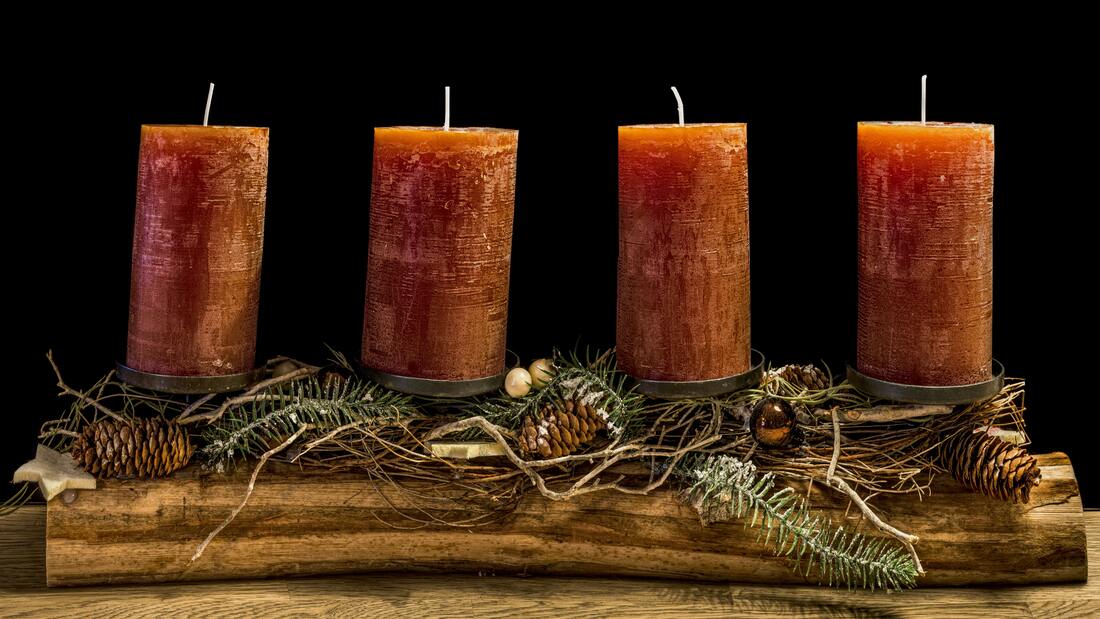|
With the rise of the internet, the multiplicity of voices making claim and counter claim can be confusing for people who are searching after God. But this is not new. In the fourth century there were many voices talking about Christianity, and the claims and counter claims were a hot topic for many ordinary people. So I imagine that Augustine, being such a great orator, attracted many people to his congregation in Hippo. But rather than bask in that glory, Augustine had a warning for his listeners. He told them that as preachers,
we can admonish by the sound of our voice, but if there be not One within that shall teach, vain is the noise we make. “The One within” who teaches us is the Spirit of God, so that the voice of our heart and the voice of God become one. Later in the same homily, speaking of the gaze of God’s Spirit, Augustine says, our witness is that eye which penetrates the heart, where others cannot look. Again, the eye of our heart and the eye of God become one. It is by hearing with the ear of the heart, and seeing with the eye of the heart that we can have confidence in our relationship with God, ourselves, and others. May you this week, amongst the multiplicity of voices you hear, take time to be aware of “the One within,” who gently whispers in your soul and lovingly gazes upon you. Brian Holliday Photo by Reign Abarintos on Unsplash
0 Comments
Winter is a season which always catches my attention and surprises me. It has not been the cold and the rain, as I expect those in winter, but it has been the crisp, clear days, and the red hues of sunsets. In our neighbourhood, it has also been the fragrance of the flowering wattle, and the vibrant bottlebrush which has been starting to bloom again. It makes me wonder as I write, how can those sunsets, fragrances, and colours ever be described in words?
Augustine, in his homily in 1 John, describes the world and its beauty as the gold ring the bridegroom gives the bride as a pledge, an earnest, not just of his love but of his own self. Augustine says: For this, the bridegroom gives an earnest, that in his earnest he may himself be loved. Well then, God gave you all these things: love Him that made them. There is more that He would give you, that is, His very Self that made these things. Now, while out walking, as I enjoy the surprises which catch my attention, I seek to hear in them the whispers of God’s deep, self-giving love for me. Such surprises of love from a Lover call my soul to love God in return. May you, as you enjoy creation’s surprises around you, also hear in them the whispers of God’s deep love for you. Brian Holliday Photo by freestocks on Unsplash Reading the Homilies on the First Epistle of John, I feel as if I am sitting in Augustine’s congregation in Hippo. His sermons are simple, and, like any good preacher, he illuminates his points with simple, everyday illustrations.
In his fourth homily on the first few verses of 1 John 3, he tackles the issue of how we love God whom we cannot see. Our work, our duty as Christians, Augustine explains to those listening, is to cultivate and grow our desire for God. He tells us, because you cannot at present see, let your part and duty be in desire. The whole life of a good Christian is an holy desire. He goes on to illustrate what he means by talking about the stretching of a bag, or a skin, so it can hold more contents. The hope we have as Christians is deferred, he says, and so it stretches us and increases our desire, our longing for God. This is our life, that by longing we should be exercised. But holy longing exercises us just so much as we prune off our longings from the love of the world. To me, this stretching of longing is a long, slow work. It is seeking to regularly give my attention to those things that connect me to the loving presence of God, and so expand my inner longing and “holy desire.” May you, this week, find your heart stretched by hope and filled with a deeper longing for the loving presence of the unseen God. Brian Holliday Photo by Rod Long on Unsplash Reading Augustine’s Homilies on the First Epistle of John, I get a strong sense of the love he has for the congregation at Hippo. In the fifth homily on 1 John 3:9-18 he explains at length how the one commandment we have as Christians is to love one another. Then he makes the following statement which I found startling when I first read it:
You may say to me, I have not seen God: can you say to me, I have not seen human beings? Love your brother and sister. For if you love your brother and sister whom you see, at the same time you shall see God also; because you shall see Love itself, and within dwells God. (adapted) As I have pondered this statement, I have been drawn to noticing how I show love those around me, and how they in turn show love me. I have realized how feeble my love is, and how harshly I criticize myself. Yet I have sought to act kindly and look with love on those around me, believing that these small, everyday connections also connect me to the loving heartbeat of God. May you, in the small acts of loving kindness you experience and give this week, be aware of seeing and hearing in them the loving heartbeat of God for you. Brian Holliday Photo by Rod Long on Unsplash Throughout the history of the Church, words of confession have often divided Christians and have led to many violent and shocking deaths. If only they had listened carefully to Augustine’s sixth homily on the First Epistle of John where, a mere three hundred years after Jesus’ death, he explain what it means to confess that Jesus Christ has come in the flesh. God becoming human flesh, says Augustine, the incarnation, is motivated by the one thing – love. Therefore, we confess that Jesus Christ came in the flesh, not by words, but by actions of love. It is on this point, he says, we should test believers,
Give the earthen vessels a tap, put them to the proof, whether haply they be cracked and give a dull sound: see whether they ring full and clear, see whether love be there. Augustine is adamant, This then is the Spirit of God, which says that Jesus has come in the flesh which says, not in tongue but in deeds; which says, not by making a noise but by loving. And that spirit is not of God, which denies that Jesus Christ has come in the flesh; denies, here also, not in tongue but in life; not in words but in deeds. What freedom and joy Augustine’s message brings, and I imagine tapping myself to see if “love be there.” May you find your faith lived out this week, “not by making a noise but by loving,” for God first loved us and came to dwell amongst us. Brian Holliday Photo by Monstera on Pexels There is something I find refreshing about Augustine’s Homilies on the First Epistle of John, something which for me is liberating. One of those things is the bold Scriptural connections Augustine makes and the clarity of his statements. For example, when 1 John 3:21-22 says we can ask God for things in prayer and know that God will hear and answer, Augustine boldly uses Paul’s cry to be rid of his “thorn in the flesh,” and Jesus’ cry to “have this cup taken from me,” as examples of unanswered prayer. “So,” Augustine asks, “which prayers does God always answer?”
He then asserts, We ought to understand that though God gives not to our will, God does give for our salvation. Or as he puts it later, God does not attend to you for your will, but God does attend to you for your healing. Recalling the main message throughout 1 John that God is Love, and that we are called to love one another, Augustine goes on to say to his congregation, Set your minds at rest: let love ask, and the ears of God are there. I am not sure that Augustine, or anyone, can truly explain answered, or unanswered, prayer. But I admire the boldness of Augustine, and the singular clarity of his explanations. It has once again made me ponder and think about my relationships, about the focus of my prayers, and about my dialogue with the Unseen God. May you, in your prayers this week, have an awareness of letting “love ask,” and a sense of the listening ear of the One who loves you so much. Brian Holliday Photo by Cottoo on Pexels This last week, I found myself deeply moved as I watched the funeral procession of Queen Elizabeth from Buckingham Palace to Westminster Hall. The marching lines of the guard of honour, the slow beat of the funeral dirge, the draped coffin on the gun carriage, and her body leaving Buckingham Palace for the last time made me realise that the Queen had died. Then, as the coffin entered Westminster Hall and the beautiful rendition of Psalm 139 filled the sparsely decorated room, I felt a sense of hope and quiet joy emerge amongst the sadness.
The singing of Psalm 139 reminded me of Augustine’s very clear understanding of why God, in Jesus, took on flesh like us. As Augustine puts it, God He was, and in flesh He came; for God could not die, flesh could die; He came then in the flesh, that He might die for us. But what speaks most to me is the simple reason Augustine gives for Jesus coming and dying. It is so we can have the hope of resurrection shown unto us. God, in great love and vulnerability, took on mortal flesh, and personally demonstrated to us the hope of resurrection. May you, this week, in your journey with the inevitable grief and loss that comes in this life, be aware of God’s great love and vulnerability which has shown to us “the hope of resurrection.” Brian Holliday The season of Advent begins in a couple of weeks, and I have been reflecting on why I look forward to it so much. When I was young my excitement was about Christmas Day itself, but now it is more about “the waiting” of Advent: the expecting, the unknowing, and the anticipating of new birth. This expectancy is not just about the birth of God amongst us, but is about our new birth as well. I sense this Advent thrill in Julian of Norwich when she says that
our Saviour is our Very Mother in whom we be endlessly borne … We are all in Him enclosed and He is enclosed in us. Meister Eckhart shares this same Advent excitement, for he writes, When we say, "God is eternal," we mean: God is eternally young, God is ever green, ever verdant, ever flowering. Every action of God is new, for God makes all things new. God is the newest thing there is; the youngest thing there is. God is the beginning and if we are united to God we become new again. As Advent approaches this year, my you be blessed by the thrill, the anticipation, and the mystery of endless new birth; that you are enclosed in God, and God is enclosed in you. BRIAN HOLLIDAY  Recently I was browsing at our local second-hand bookshop and came across a small paperback by Anne Morrow Lindberg, called Gift from the Sea. The Lindberg name attracted me, and, yes, Anne was the wife of Charles Lindberg.* The book is a series of profound meditations on different seashells that Anne found on her retreats at the beach, often in a favourite island setting. Towards the end of the book, Anne reflects on her tendency on retreat to initially collect as many shells as possible, but then, as time goes by, she becomes more selective. She notices that one or two shells, surrounded by empty space, speak to her more deeply about their beauty and uniqueness than many shells clustered together. Similarly, she reflects, the retreat touches her so deeply because she has few activities, few demands, and lots of empty space. She goes on to say: Only in space are events and objects and people unique and significant – and therefore beautiful. A tree has significance if one sees it against the empty face of sky. A note in music gains significance from the silences on either side. A candle flowers in the space of night. Even small and casual things take on significance if they are washed in space, like a few autumn grasses in the corner of [a Japanese ink] painting, the rest of the page bare. This week is Holy Week. It is filled with significance for Christians, and it can be a very busy and cluttered time for churches and families. But may we find empty space to sit with the uniqueness and beauty of this time, both for ourselves, the world, and for all creation. May God, who seeks to bless us and the world through Jesus, bless you this Holy Week. Brian Holliday * Charles and Anne were both pioneer aviators, Charles famously flying the first solo trans-Atlantic flight in the Spirit of St Louis. Tragically, in 1932, their first child was mysteriously kidnapped and murdered. Marcus Aurelius, a Roman Emperor and Stoic philosopher in the second century AD, wrote his third book of meditations at the fortress of Carnuntum on the Danube. You can still visit the ruins of the fort today. I feel sorry for Aurelius who spent much of his nineteen-year reign fighting Rome’s many frontier enemies. Yet, in spite of that, he is known as one of Rome’s five good emperors. The goodness of this Stoic, warrior man comes through his many reflections on the purpose of this life, which he sums up as three things; to do what’s right, to serve others, and to love God. He writes, for example:
Wash yourself clean. With simplicity, with humility, with indifference to everything except right and wrong. Care for other human beings. Follow God. And in another meditation; To move from one unselfish action to another with God in mind. I find it quite remarkable that this “pagan” philosopher in antiquity arrived at much the same conclusions as the preacher in Ecclesiastes, as Christ in the Gospels, and Paul in the Epistles. And today, in a year of pandemic, we, too, can find truth and goodness in focusing on doing what is right, in caring for other human beings, and in loving God. May God, who speaks to us all when we listen, bless you this week as we continue to journey through Lent. Brian Holliday Photo by Matthias Zomer from Pexels |
AuthorSelected members of the Dayspring Community make contributions to this page on a regular basis. Archives
May 2023
Categories |

Dayspring acknowledges the role of First Nations people as the traditional custodians of the land on which Dayspring Events are held. Dayspring recognizes their unbroken continuing connection to land, water and community, their efforts to preserve and strengthen their culture and language and pays respects to elders past present and emerging who share in this work.
Except as permitted by the copyright law applicable to you, you may not reproduce or communicate any of the content on this website, including files downloadable from this website without the permission of the copyright owner.
EMAIL: [email protected]
© Dayspring Community (WA) Inc. 2023
Except as permitted by the copyright law applicable to you, you may not reproduce or communicate any of the content on this website, including files downloadable from this website without the permission of the copyright owner.
EMAIL: [email protected]
© Dayspring Community (WA) Inc. 2023
Proudly powered by Weebly










 RSS Feed
RSS Feed